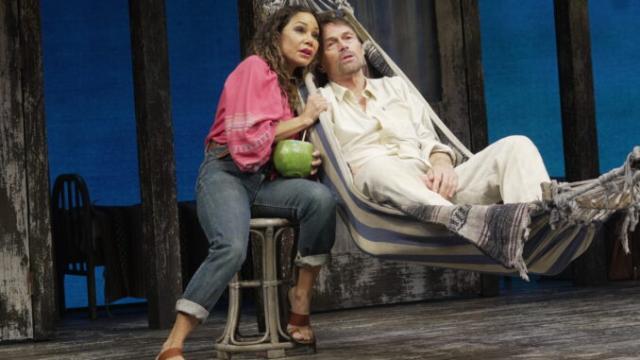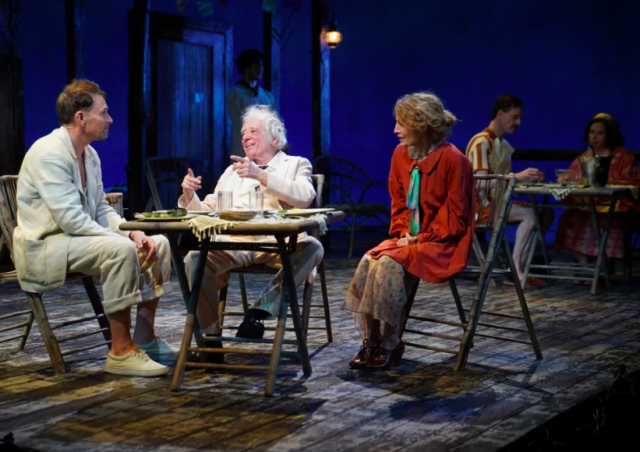

The revival of Tennessee Williams’ The Night of the Iguana from La Femme Productions at the Pershing Square Signature Center sounded so promising (Note: this is not a Signature Theater production). There was an eclectic, intriguing cast—Timothy Daly from film and the TV series Wings, Daphne Rubin-Vega from Rent and Anna in the Tropics, the dazzlingly funny comedian and singer Lea DeLaria, veteran actor-director-playwright Austin Pendleton, and Jean Lichty, the founder and executive producer of the company who gave a credible performance in La Femme’s revival of Williams’ rarely-seen A Lovely Sunday for Creve Coeur. The director is Emily Mann, who has helmed numerous captivating productions including Having Our Say and an interesting revival of Williams’s A Streetcar Named Desire. The design team includes Tony and Obie winners. So what went wrong?
Perhaps it’s lack of rehearsal, but the company fails to make the vital compassionate connection within its ranks. With that element missing, Williams’s work can descend into melodrama and shouting matches, particularly in this late-career gem. Iguana was Williams’s last critical success on Broadway. Opening in 1961 with the stellar likes of Bette Davis and Margaret Leighton, who won a Tony for Best Actress, Iguana charts the familiar Williams territory of lost souls battling the forces of sexuality, religion, and spirituality. (The 1964 film version featured one of Richard Burton’s better cinematic turns, probably the best one by Ava Gardner, and a stellar one by Deborah Kerr.)
The main combatant is the shattered Lawrence Shannon, a defrocked priest reduced to conducting tours, and crash landing in a second-rate hotel in 1940 Mexico. He’s at the end of his metaphysical rope as he can no longer fend off his inner demon of doubt and self-loathing, which he calls the “spook.” Metaphorically jousting for Shannon’s soul are two larger-than-life women. Representing physical appetite is the hotel proprietress Maxine Faulk, a ravenous widow bent on Shannon filling her late spouse’s shoes, literally and figuratively. Symbolizing the aesthetic and spiritual side is Hannah Jelkes, a virginal wandering artist loaded with empathy for a fellow sufferer. She is accompanied by Nonno, her elderly grandfather, a poet hovering near death, clinging to mortality in order to finish a final piece of work.
The beauty of Williams’s poetic script is that none of these characters comes across as merely symbols. They’re flesh and blood people with complicated emotions and motives. Unfortunately, most of the cast here barely scratches the surface of these multidimensional figures, and Mann’s direction fails to plumb the depths of Williams’s sensitive observations on the human condition.
As Shannon, Tim Daly captures the desperation and self-deprecation, but he fails to deeply explore Shannon’s inner conflict or to make the necessary chemical bond with either Daphne Rubin-Vega’s earthy Maxine or Jean Lichty’s shallow Hannah. Towards the end of the play Rubin-Vega does reveal the loneliness beneath Maxine’s animal bravado (she is also very funny with some of Maxine’s cruder moments). But Lichty is entirely out of her depth as the multifaceted Miss Jelkes. There is no passion, depth or poetic spirit in her one-note performance. The most striking evidence of this comes at what should be a climactic moment in the third act: the nearly blind and deaf Nonno (a sensitive Austin Pendleton) calls for Hannah to write down his final work as he is no longer capable of holding a pencil or recalling his words for long periods. You would expect Hannah to get out a notebook and attentively jot down every word (it’s a truly beautiful poem by Williams). This is probably the most moving and important moment of the entire play. But Lichty makes a half-hearted grab for a pad and pencil, sits and looks lovingly at Pendleton and writes down nothing until he has almost finished his recitation. This shows the actress is not connected to the text in an honest and truthful manner.
Lea DeLaria does have humorous moments as the repressed lesbian college teacher in Shannon’s woebegone tourist party, but she plays too many of them broadly for laughs instead of insights into this angry woman’s psyche. The reliable Keith Randolph Smith gives more depth to the small role of Jake Latta, the blustering, no-nonsense guide taking over Shannon’s duties.
The design could not be better. Beowulf Boritt’s impressionist set suggests a fragile platform on the edge of an abyss where all of Williams’ souls are teetering. Jeff Croiter’s exquisite lighting paints a colorful canvas of violently expressive sunsets and skyscapes. Jennifer von Mayrhauser’s costumes define the characters with wit and economy, while Darron L. West’s sound design creates the aural images of the music of the period and locale as well as the desperate movements of the titular lizard straining to escape its trap under the hotel terrace. Too bad the production is not as beautiful as the design. Iguana deserves an exemplary revival both dramatically and physically; this isn’t it.
